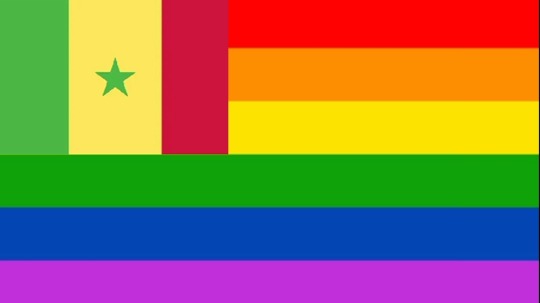#Gurdigan
Explore tagged Tumblr posts
Text
LGBTQI+ rights in Senegal 🇸🇳
Senegalese LGBTQ+ citizens has to exprience legal & social challenges, not exprienced by non-LGBTQ+ citizens. In Senegal, homosexuality & sex outside the traditional marriage is a punishable crime.

Legality of Homosexuality
Same-sex sexual conducts between men & between women are illegal in Senegal since 1966.There's no equal age of consent.
Article 319 in the Senegalese Penal Code states,
Without prejudice to the more serious penalties provided for in the preceding paragraphs or by articles 320 and 321 of this Code, whoever will have committed an improper or unnatural act with a person of the same sex will be punished by imprisonment of between one and five years and by a fine of 100,000 to 1,500,000 francs. If the act was committed with a person below the age of 21, the maximum penalty will always be applied.
Same-sex unions
Same-sex unions,marriages are not recognized by the state. Senegalese society sees same-sex relationships & unions as a deviation of west.
In 2008, Icone magazine reported about an alleged gay marriage that had taken place in Senegal. The wedding's photographs created an outrage among public.
Adoption
According to 2011 United States Department of State's report, “a (heterosexual) married couple for a minimum of 5 years or an unmarried person who is at least 35 years of age is eligible to adopt a Senegalese child if there is at least 15 years between the age of the child and the age of the adopting parent.”
There is a probability that a single homosexual/bisexual person may adopt a child, because the state do not specifically ban adoption by a homo/bisexual person. We don't know about transgender & intersex persons.
Public Opinion
According to the 2013 Pew Global Attitudes Project, 97% of Senegalese people believed that homosexuality should not be accepted by the society.
Discrimination
LGBTQI+ people in Senegal face widespread discrimination, violence & social stigma. According to local human rights groups, LGBTQI+ people usually face harassment by police and ill-treatment in prison.
In February 2008, five men were arrested for an alleged gay wedding; but later they were released without charge.This incident stirred a mass public outrage. On 19 December 2008, nine men were arrested on charges of homosexuality in a private flat in Dakar. One of the arrestees was Diadji Diouf, the owner of the flat and president of the association AIDES Senegal. The detainees were repeatedly tortured while in the police custody. On 6 January 2009, they were convicted of "indecent conduct and unnatural acts" and for "being members of a criminal group". The senegalese judge said that, AIDES Senegal was a "cover to recruit or organize meetings for homosexuals, under the pretext of providing HIV/AIDS prevention programmes". The Court of Appeals overturned the convictions in April 2009 and ordered the immediate release of the detainees. While incarcerated, the nine were held in special quarters because of threats from other inmates. Shortly thereafter, conservative religious leaders & member of parliament Mbaye Niang organized a march against homosexuality. In the mid-2009, Senegalese islamists and homophobes created the Front islamique pour la defense des valeurs éthiques (English: The Islamic Front for the Defense of Ethical Values), advocated for the death penalty of queers.
There were multiple reports around the same time, in which bigot people digging up the bodies of deceased "goor-gigen" (a Senegalese term for transgender, gender non-confirming) in cemeteries. Local and international press reported in May 2009 that the corpse of a goor-gigen man reputed to have been homosexual was twice disinterred from a muslim cemetery in Thies. The first time, the body was left near the grave. After his family reburied him, the body was disinterred a second time and dumped outside his family's home.
In March 2010, the United Nations Working Group on Arbitrary Detention found that Senegal's National Police had detained persons who were alleged to have committed "unnatural sexual acts". The group recommended that Senegal, "Pay particular attention to detentions on the grounds of offending decency or public morality, with a view to avoiding any possible discrimination against persons of a different sexual orientation" In December 2012, a gay couple was viciously beaten near Dakar by one of the men's parents.
In 2016, Senegalese President Macky Sall denied to decriminalize anti-gay law. He said: "Never, under my authority, will homosexuality be legalized in the Senegalese lands."
Gender Identity
Senegal do not allow trans people to legally change their gender. There's no non-binary or third gender option for gender variants.
Gūrdigan (means man-woman in wolof) is a gender variance folk in Senegal,Mauritania, Gambia. Many of them converted to Islam, when Islam came to Africa. Most gūrdigans are born as male, few are born as intersex. Gūrdigan present themselves in very feminine way & play the feminine gender role in their communities.Historically, they played a role of entertainer in marriage ceremony, other cultural occasions, & matchmakers between men and women. But nowadays they face widespread stigma & hostility in Senegalese society.
Summary:
Same-sex sexual activity - ❌
Equal age of consent - ❌
Recognition of same-sex unions,marriages - ❌
Anti-discrimination laws in hate speech and violence - ❌
Anti-discrimination laws in the provision of goods and services - ❌
Anti-discrimination laws in employment - ❌
Adoption by LGBTQI+ person - ✔️/❌ [ambiguous]
Right to change legal gender - ❌
LGBTQ+ persons allowed to serve openly in the military - ❌
MSMs allowed to donate blood - ❌
10 notes
·
View notes